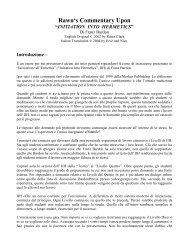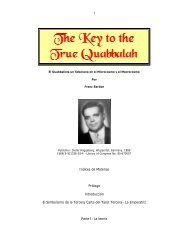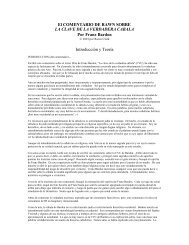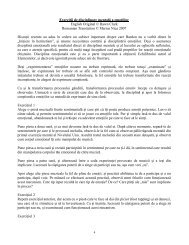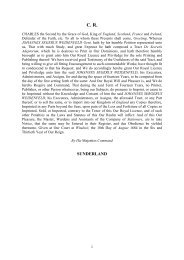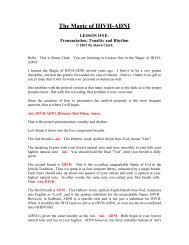Hermetic Philosophy and Alchemy - A Bardon Companion
Hermetic Philosophy and Alchemy - A Bardon Companion
Hermetic Philosophy and Alchemy - A Bardon Companion
Create successful ePaper yourself
Turn your PDF publications into a flip-book with our unique Google optimized e-Paper software.
Then we have the remarkable instance of Cornelius Agrippa, a man of powerful <strong>and</strong> penetrating<br />
genius who, having possessed himself of the means <strong>and</strong> principles of the Occult Science from his<br />
friend, the wary <strong>and</strong> learned Abbot Trithemius, set to work something it would seem after the example<br />
of Friar Bacon, proving them in a self-sufficient order. His three books of Occult <strong>Philosophy</strong>,<br />
especially the first two, illustrate the practical bias <strong>and</strong> enterprising nature of his mind; but as he<br />
declares, he had not, when he wrote them, arrived at a full experience, nor was he able to make the<br />
philosophers’ stone. But it was this discovery, made later in life, which caused him to be discontented<br />
with his former revelation, <strong>and</strong> to publish that book on the Vanity of the Sciences, which has been<br />
considered as a recantation of his former philosophy; but which is in fact no recantation at all, but a<br />
consummation rather <strong>and</strong> conclusion in general of his works. Any one taking the pains to read may<br />
perceive that Agrippa wrote it neither in ignorance nor in despair of human knowledge. It was by<br />
searching <strong>and</strong> proving the magnitude of the Mystery that he arrived at that final <strong>and</strong> convictive faith,<br />
which is as much above ordinary science as the vulgar credulity of mankind is below it. It is not the<br />
part of a mind, sane <strong>and</strong> philosophic to fall back content in ignorance, or to retrograde passively in<br />
despair of its object. The vanity of particular <strong>and</strong> temporal sciences is discovered by comparison only<br />
in the broad day light of universal truth; <strong>and</strong> there stood the magician at last when, as it were from the<br />
top of Celsus’ ladder, looking down upon the steps by which he had climbed, <strong>and</strong> whereon he had<br />
successively rested, he observed their inferiority <strong>and</strong> the small prospect they afforded in comparison<br />
with that which he now, at their clear summit, enjoyed. Let any one read from the Vanity of the<br />
Sciences the chapter on <strong>Alchemy</strong>, <strong>and</strong> judge whether the author contradicts, as the report has said, or<br />
contemns merely the experience of his early youth; <strong>and</strong> where, after showing the folly of pretenders,<br />
speaking of the genuine <strong>Hermetic</strong> art, he says, --- "I could tell many tings of this art, if I had not sworn<br />
to keep silence, <strong>and</strong> this silence is so constantly <strong>and</strong> religiously observed of the ancient philosophers,<br />
that there is bound no faithful writer of approved authority that hath openly described this art: which<br />
thing has induced many to believe that all books of this art were but of late years invented, etc. Finally<br />
of the one blessed stone alone, besides which there is no other thing, the subject of the most holy stone<br />
of the philosophers, to speak rashly, would be a sacrilege <strong>and</strong> I should be foresworn" (70). Looking to<br />
the final chapters of the same work also, we observe the ground of the whole <strong>Hermetic</strong> philosophy laid<br />
out, <strong>and</strong> the relative vanity of worldly science to that, which is universal, rational, <strong>and</strong> divine. The<br />
capabilities of the subject are great; <strong>and</strong> had it been treated in the usual <strong>and</strong> masterly style of a scholar<br />
of Nettesheim, it would have remained a work of lasting value; but he was fettered by oaths <strong>and</strong> had<br />
been somewhat conscience stricken; <strong>and</strong> the monks, whom he had formerly censured, eagerly<br />
promulgated the whole as a recantation of former errors, holding it in this light <strong>and</strong> as an<br />
acknowledgment of the sufficiency of their own doctrine <strong>and</strong> of the common faith for salvation.<br />
In the beginning of his extraordinary career, Theophrastus Paracelsus proposed openly to discover the<br />
hidden secret of philosophy; but the world scoffed at his pretensions, abused <strong>and</strong> persecuted him; <strong>and</strong><br />
all the revenge he indulged in was to leave it unenlightened. The writings he put forth are, with few<br />
exceptions, filled with subtle malice, as it were, so many sarcasms upon mankind <strong>and</strong> leading them far<br />
away, through alluring sophisms, from the straight way of truth. Surely, as Ashmole remarks,<br />
incredulity appears to have been given to the world as a punishment; yet neither in its belief did it<br />
speed better, but has still plodded on in error for want of thought, <strong>and</strong> through all ages men have<br />
suffered in ignorance, on account mainly of the indefiniteness <strong>and</strong> selfishness of their desires. Of the<br />
numerous books attributed to Paracelsus, <strong>and</strong> given together as his works, the three Addresses to the<br />
Athenians, <strong>and</strong> the Aurora, are amongst the best. Those to the Athenians have been translated into<br />
English, <strong>and</strong> published with The <strong>Philosophy</strong> of J. Crollius, a disciple, <strong>and</strong> the Aurora also is to be met<br />
with, though more rarely, in company with the Water Stone of the Wise Men, by J. Grasseus. With<br />
respect to the private history <strong>and</strong> character of this extraordinary man, accounts differ, <strong>and</strong> opinions<br />
accordingly; but his fame, <strong>and</strong> the authority of his doctrine, lasted down through a long period of time.<br />
His early death has been adduced as an argument against the probability of his being possessed of the<br />
elixir he boasts; <strong>and</strong> by others as a proof of his having been poisoned: but the poison of intemperance<br />
<strong>and</strong> irregular living has also been considered as especially likely to be fatal to one who was in the<br />
habit of taking a potent spiritual medicine, which would heighten the spiritual consequences of<br />
depravity <strong>and</strong> habitual excess, <strong>and</strong> accelerate dissolution in the conflict of opposite principles (71).<br />
Paracelsus, notwithst<strong>and</strong>ing the world’s neglect, had numerous disciples, increasing also after his



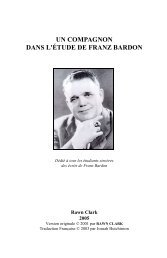
![Magie de YHVH-ADNY et Archeus[1]](https://img.yumpu.com/16926522/1/190x245/magie-de-yhvh-adny-et-archeus1.jpg?quality=85)
